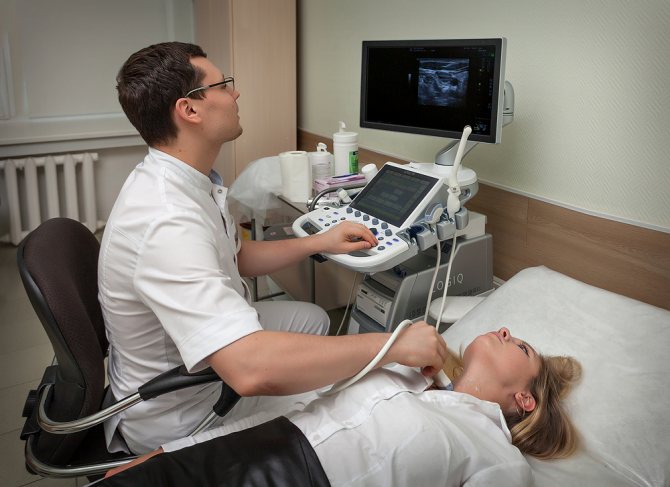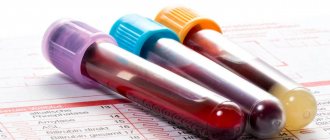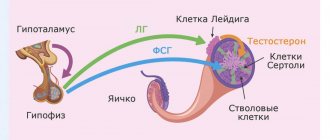Why do endocrinologists need hormone tests?
The content of the article
Even the most experienced and qualified doctor cannot make an accurate diagnosis without appropriate research. Hormonal blood tests allow you to assess the patient’s hormonal status and determine where its disturbances occur.
If the patient has a hereditary predisposition to any diseases (for example, diabetes), tests will allow timely detection of the onset of the disease and begin its treatment. Thanks to this, it is possible to prevent the development of dangerous complications and further progression of diseases.
In what cases are hormone tests prescribed?
An endocrinologist may prescribe tests to determine the level of hormones in the blood in the following situations:
- Suspicion of hormonal imbalance;
- Problems with conception;
- Metabolic disorders in the body;
- Irritability, nervousness;
- Constant feeling of fatigue and apathy;
- Hair loss or, conversely, active growth;
- Problems with excess weight;
- Increased sweating;
- Dry mouth, thirst;
- Changes in appetite;
- Sore throat;
- Sleep disorders;
- Decreased performance.
All this may indicate disturbances in the functioning of the endocrine system.
What ailments can an endocrinologist help overcome?
The doctor works with human organs that are involved in the regulation of internal systems. These may be the adrenal glands, thyroid gland, gonads, pituitary gland, pancreas, thymus gland, hypothalamus.
List of ailments treated by the expert:
- Diabetes insipidus is a disease resulting from a malfunction of the pituitary gland. The symptom is a constant feeling of thirst, which leads to frequent urination;
- autoimmune disorders - a lack of iodine in the body leads to an increase in the size of the thyroid gland and a malfunction in its functioning;
- diabetes mellitus – diseases caused by a deficiency of insulin in the body;
- disruptions in the metabolism and absorption of calcium - low or high concentration of calcium in the blood;
- acromegaly – excessive production of growth hormone;
- Cushing's disease is a disease that leads to disruption of the adrenal glands;
- neuropsychiatric disorders;
- obesity;
- sexual dysfunction.
Preparing for endocrinological tests
Proper preparation for testing plays a huge role in the reliability of laboratory test results. The patient must comply with the following rules:
- Come for a blood test strictly on an empty stomach. Even drinking plain water is not advisable;
- The day before the procedure, you should not drink alcoholic beverages;
- Physical activity on the eve of blood donation should be limited;
- It is not recommended to take medications before the procedure. An exception is cases when the drug is necessary for the patient, but in this case the attending physician and laboratory assistant should be warned about taking the medication;
- It is advisable not to smoke before taking blood for analysis;
- Hormone tests should be taken in the morning.
It is necessary to follow the doctor's recommendations regarding testing for sex hormones at appropriate periods of the cycle.
What tests should you take before losing weight?
Basic knowledge of endocrinology, acquired in courses for nutritionists, will allow you to suspect certain disorders based on the symptoms described. However, in matters related to health, there is no need to guess, so it is better to prescribe the following tests to the client:
- A complete blood test showing the number of leukocytes, lymphocytes, monocytes, red blood cells, platelets, ESR and hemoglobin level. It can be used to judge the general state of a person’s health, make a preliminary diagnosis of anemia, suspect a tendency to thrombosis and allergic reactions, and see the presence of inflammatory, bacterial or viral processes.
- Biochemical blood test, in particular, liver and kidney complex, study of pancreatic functions. It will show the level of fat metabolism in the body, total cholesterol and lipoprotein levels, the amount of insulin, leptin and C-peptides in the blood, and much more. Biochemistry can be used to judge the functioning of the kidneys, liver and pancreas.
- A blood sugar test is the primary diagnosis of diabetes. In case of elevated fasting glucose levels, a glucose tolerance test is additionally prescribed, a dynamic blood sugar test is performed (fasting and after meals), an insulin level test, and others.
- Enzymatic analysis of the pancreas to study the amount of secreted enzymes (pancreatic and alpha-amylase, lipase). Its results allow us to judge the efficiency of food digestion in the body.
- Analysis of thyroid hormones (T3, T4, TSH and others). Allows you to suspect hypothyroidism or hyperthyroidism.
- Analysis for glycated hemoglobin, which shows the average blood sugar level over the last 6-8 weeks (normally it should be up to 6%).
- Analysis for the hormone cortisol, which is involved in the formation and accumulation of abdominal fat. Activation of cortisol occurs during periods of stress, so after serious stressful situations it is necessary to take it.
- Analysis for sex hormones (only women are taken!), namely: prolactin, estradiol, progesterone and oxyprogesterone, testosterone. These tests in women of reproductive age are taken on certain days of the menstrual cycle.
- A general urine test that will show the condition of the genitourinary system and kidneys.
After these tests, the endocrinologist (gynecologist-endocrinologist) and nutritionist may prescribe additional studies that are needed for a more accurate diagnosis and prescribing appropriate treatment.
What tests does the endocrinologist prescribe?
Depending on the patient’s symptoms and complaints, the doctor may prescribe several tests. All tests showing hormone levels can be divided into several subgroups:
- Thyroid hormones - these include TSH, T3 (total, free), T4 (total, free), thyroglobulin, anti-TPO;
- Female sex hormones - estradiol, FSH, progesterone, LH, prolactin;
- Male sex hormones – testosterone, dihydrotestosterone;
- Adrenal hormones – aldosterone, DHEA, DHEA-S, 17-OH-progesterone, cortisol;
- Pancreas – proinsulin, insulin, c-peptide.
What tests should be taken before seeing an endocrinologist?
An examination of the body is prescribed depending on the patient’s current complaints.
- Typically, the list of laboratory tests includes the following:
- Study of thyroid hormones, such as T4, TSH, T3, anti-TPO;
- Taking tests to assess the state of female and male sex hormones prolactin, estradiol, progesterone, FSH, LH, dihydrotestosterone, testosterone;
- Study of pancreatic and adrenal hormones (insulin, c-peptide, proinsulin, cortisol, DHEA);
- General and biochemical blood test;
- Analysis of urine.

3 The process of performing an ultrasound of the thyroid gland In addition to laboratory tests, the endocrinologist can prescribe an instrumental examination using ultrasound, magnetic resonance imaging, and X-ray examination (CT).
Norms and deviations
Each laboratory has its own standards, which may differ depending on the reagents used. However, there are generally accepted reference values.
| Norms | Deviations |
| TSH (mU/l) – 0.4-4 | An increase in TSH levels indicates diseases of the thyroid gland, as well as adrenal insufficiency. Reduced levels indicate thyrotoxicosis and excessive intake of hormonal drugs. |
| Total T3 (pmol/l) – 1.3-2.7 Free T3 (pmol/l) – 2.6-5.7 | An increased level of free T3 may indicate hyperthyroidism, hormonal toxicosis, general hepatitis, taking hormonal contraceptives, pregnancy. A decrease in these values indicates the use of iodine-containing drugs, kidney and liver diseases. |
| T4 total (nmol/l) – 58-161 T4 free (pmol/l) – 9-22 | An elevated T4 result indicates adrenal insufficiency, oral contraceptive use, kidney and gastrointestinal diseases. Reduced levels are signs of pregnancy, heavy physical activity, and fasting. |
| Thyroglobulin (ng/ml) – 1.7-56 | An increase in TG indicates thyrotoxicosis, thyroiditis, or benign adenoma. A decrease in this indicator indicates dysfunction of the thyroid gland. |
| AT to TPO (IU/ml) – 0-35 | Anti-TPO results that are very different from the norm indicate autoimmune diseases of the thyroid gland. |
| Estradiol (pm/l) – 200-285 (follicular phase), 440-575 (luteal phase), 50-133 (menopause) | An increase in estradiol levels indicates ovarian tumors, a decrease indicates ovarian dysfunction. |
| Prolactin (mcg/l) – 130-540 (at childbearing age), 107-290 (during menopause) | An increase in prolactin indicates pregnancy, breastfeeding, hypothyroidism, and pituitary tumors. |
| FSH – 2.7-6.7 (during ovulation), 2-4 (luteal phase), 29.5-55 (during menopause) | Elevated FSH indicates the onset of menopause, as well as ovarian failure. A decrease in values is a sign of estrogen intake and ovarian failure. |
| LH (mIU/ml) – 1.54-2.56 (during the luteal phase), 18-53 (during ovulation), 3.3-4.66 (follicular phase), 29.7-43.9 (during menopause ) | Elevated LH results indicate dysfunction of the gonads, and decreased results indicate pathologies of the pituitary gland. |
| Progesterone (nm/l) – 1-2.2 (follicular phase), 23-30 (luteal phase), 1-1.8 nm/l (menopause) | Elevated levels of progesterone in the blood can be a sign of adrenal formations, while a decrease in the level can be a sign of ovarian sclerosis. |
| Testosterone (ng/ml) – 0.2-1 in women, 2-10 in men | |
| Aldosterone (pg/ml) – 58-172 | An increase in aldosterone indicates proliferation of the adrenal glands or tumors, a decrease indicates severe fatigue, pregnancy, and thrombosis of the adrenal veins. |
| Cortisol (nm/l) – 230-750 | An increase in cortisol levels in the blood may be a sign of polycystic ovary syndrome, tumors of the adrenal cortex (both benign and malignant), dysfunction hypothesis. A decrease in values indicates adrenal insufficiency. |
| Insulin (µU/ml) – 3-20 | An increase in insulin levels in the blood indicates pregnancy, liver dysfunction, prolonged fasting, and abuse of sweet foods. A decrease in this indicator indicates possible overeating, carbohydrate abuse or heavy physical activity. |
| Proinsulin (pmol/l) – 0.7-4.3 | Increased proinsulin results indicate diabetes mellitus, pancreatic tumors, and renal failure. Reduced levels are signs of an insulin-dependent form of diabetes. |
| C-peptide (ng/ml) – 0.9-7.1 | An increase in c-peptide levels indicates non-insulin-dependent diabetes mellitus, renal failure, insulinoma, and polycystic ovary syndrome. A decrease can be caused by insulin-dependent diabetes mellitus, hypoglycemia, and surgery to partially remove the pancreas. |
How is a doctor's examination carried out?
Diagnosis of the disease begins with collecting data and identifying symptoms that concern the patient. Next, the expert, depending on the need, can feel the glands and genitals to determine their normal condition in order to confirm or refute inflammatory processes in the body.
An additional examination measure may be listening to the heart rhythm and measuring blood pressure. To establish an accurate diagnosis, MRI, puncture, and ultrasound may be prescribed.
The endocrinologist also deals with the issue of the patient’s metabolism and normal weight, so his office may have electronic scales and a measuring tape. The doctor also has a neurological kit for diabetic neuropathy at his disposal.









